Calcium - The Foundation for Strong Bones

What is Calcium & Why It's Important For Bones?
Have you ever found yourself sitting on the sidelines of life, due to aches and pains? Our bone health tends to slip under the radar until discomfort forces us to pay attention. Calcium is a mineral that not only fortifies our bones and teeth but also helps our muscles move smoothly and allows our nerves to chat with our brain.
Calcium is important for maintaining strong and healthy bones, but it's not as easy as just "drinking milk". Even with a good diet and regular exercise, there's still a risk of fractures and diseases like osteoporosis. In this blog, we will explore the essential role of calcium in our health and body. We will discuss its importance, how much you need, and practical ways to ensure you're getting enough.
Is Calcium Enough To Build Bones?
Calcium reigns supreme when it comes to bone health. It forms the bedrock of our skeletal system, providing it with strength and stability. Calcium is important at every stage of life, during our development years in early childhood all the way through to old age. More than 99% of the body's calcium is deposited in our bones and teeth, and the remaining 1% is found in blood, muscle, and other tissues (1).
Providing bones with enough calcium is important, but the actual process of building new bone demands a synergy of various vitamins and minerals. Key contributors to bone-building include vitamin D, vitamin K, vitamin B, boron, magnesium. Scientific studies and research have consistently shown that deficiencies in calcium contribute to weaker bones and an increased risk of bone-related issues like osteoporosis and fractures. (2)

Calcium & Muscle Movement
Calcium is the driving force behind every movement, from the smallest wink to the heart's steady beat. When your brain sends a signal for a muscle to move, calcium ions rush into muscle cells, initiating a series of events. These ions bind to proteins, allowing the muscle fibers to contract effectively. This intricate process ensures that muscles respond accurately to signals from the nervous system. Without sufficient calcium, this coordination falters, leading to potential disruptions in muscle movement. Making it a fundamental cornerstone in the biochemistry that directs the smooth functioning of muscles.
Calcium's Role in Nerve Communication
Beyond flexing muscles, calcium also plays a vital role in how our nerves communicate. It acts like a messenger, ensuring that signals from the brain are delivered accurately throughout the body. When calcium ions enter the nerve cell it prompts the release of neurotransmitters, enabling the transmission of signals from one nerve cell to the next. This function is essential in the early stages of life, where calcium's influence shapes the development of our nervous system, setting the stage for how neurons function and communicate.
How Can You Spot Calcium Deficiency Early On?
If you have been experiencing frequent muscle cramps, unusual fatigue, or your heart rhythm seems off, it might be more than just daily stress or exhaustion. These can be tell-tale signs of calcium deficiency, a condition that shouldn't be taken lightly. Lack of calcium in the body leads to weakened bones, increasing your probability of fractures and conditions like osteopenia and osteoporosis.
For children, the stakes are even higher. Insufficient calcium during these crucial growing years can impede proper bone development, potentially leading to rickets, a condition marked by soft and weak bones. Calcium deficiency can also affect your overall well-being, impacting muscle function and nerve signaling. It’s essential to recognize these signs early and adjust your calcium intake accordingly to safeguard your health and ensure your body functions optimally.
Absorption of Calcium
Unlocking the full potential of calcium relies heavily on its absorption. Absorption determines how much of the calcium we consume from our diet actually enters our bloodstream and becomes available for various bodily functions. When we eat foods containing calcium, our stomach breaks it down, and its absorbed in the small intestine. Several factors, including age, dietary influences, and health conditions, influence how well the body absorbs calcium. Pregnant women and individuals experiencing menopause may face challenges in calcium absorption, as hormonal changes can impact the body's ability to retain and utilize calcium.
Recognizing this, Ocean Essence includes Vitamin D, Magnesium, Vitamin K2 to improve calcium absorption. Vitamin D, ensures calcium is effectively absorbed from the digestive tract into the bloodstream. Magnesium supports the activation of vitamin D, creating a synergistic effect that promotes optimal calcium utilization. Together with vitamin K, directing where calcium is need, ensuring it is appropriately utilized in the bones and teeth rather than accumulating in soft tissues or arteries.
Thinking of Trying OceanEssense?
Ocean Essence provides a healthy balance of bone nourishing minerals and vitamins including Calcium, Magnesium, Vitamin D, and Vitamin K.
What Are Some Natural Sources of Calcium?
Now that we are aware of the importance of calcium and its ideal intake, let's look at some natural food sources that can meet our calcium needs. Dairy products like milk, cheese, and yoghurt are classic choices for calcium. However, for those who prefer non-dairy options, there are plenty of alternatives.
Leafy greens such as kale, collard greens, and spinach are excellent for plant-based calcium. Almonds stand out among nuts for their calcium content and healthy fats. Seeds like chia and sesame can be sprinkled over salads or added to smoothies for an extra calcium boost. Seafood enthusiasts can opt for canned sardines and salmon (with bones), which offer both calcium and omega-3 fatty acids.
The Soil Crisis...
Unfortunately, our bones are facing unprecedented challenges beyond our control. The erosion of topsoil is occurring at an alarming rate, depleting 10 times faster than it can be replenished, resulting in a severe mineral deficiency in our crops (3). This means that the vegetables and fruits we consume today offer substantially less nutritional value than they did just a few decades ago. The impact is particularly pronounced during the crucial years of bone development in adolescence, with only 15% of girls aged 9-13 and less than 10% of those aged 14-18 meeting their daily calcium requirements.
Recommended Dietary Allowance (RDA) of Vitamin C
So, we know calcium is important, but do you know how much is the right amount? Too little can lead to calcium deficiency, affecting bone health and more, while too much can lead to hypercalcemia, with its own set of health issues. Knowing the right intake is crucial for maintaining that balance. Consuming a minimum of 800 mg of dietary calcium or supplementing with at least 1,000 mg daily can lead to an increase in bone density, albeit modestly, by approximately 0.6% to 1.8%.
The right amount of calcium intake varies with age and gender. Children and teenagers have higher requirements to support their growing bones. Adults generally need less, but the intake increases again for older adults, particularly for women post-menopause, to counteract the natural bone density loss that comes with ageing. Understanding and adapting your calcium intake according to these changes is essential for optimal health.
Click to view RDA table

Age Group
Recommended Daily Intake (mg/day)
Adults
20-30
Children (1-3)
5-10
Children (4-8)
10-15
Children (9-13)
15-25
Get Your Ocean Essence Today
Bones are complex, we make it simple.
When Diet Isn't Enough
When Diet Isn't Enough
Calcium supplements are a practical solution because lifestyle, dietary preferences, or specific health needs make it a challenge to get enough calcium from food alone. They are particularly helpful if you are dealing with lactose intolerance, following a vegan diet, or experiencing age-related changes that affect nutrient absorption.
Supplements like Ocean Essence can help in bridging the gap between your dietary intake and the body's needs. It helps promote bone metabolism, supports joint health, and enhances digestive digestive balance. It includes calcium, magnesium, Vitamin D, K2, and C.
By choosing Ocean Essence, you're not just nurturing your bone health with quality supplements; you're also aligning with a lifestyle that respects and harnesses the power of nature for wellness.

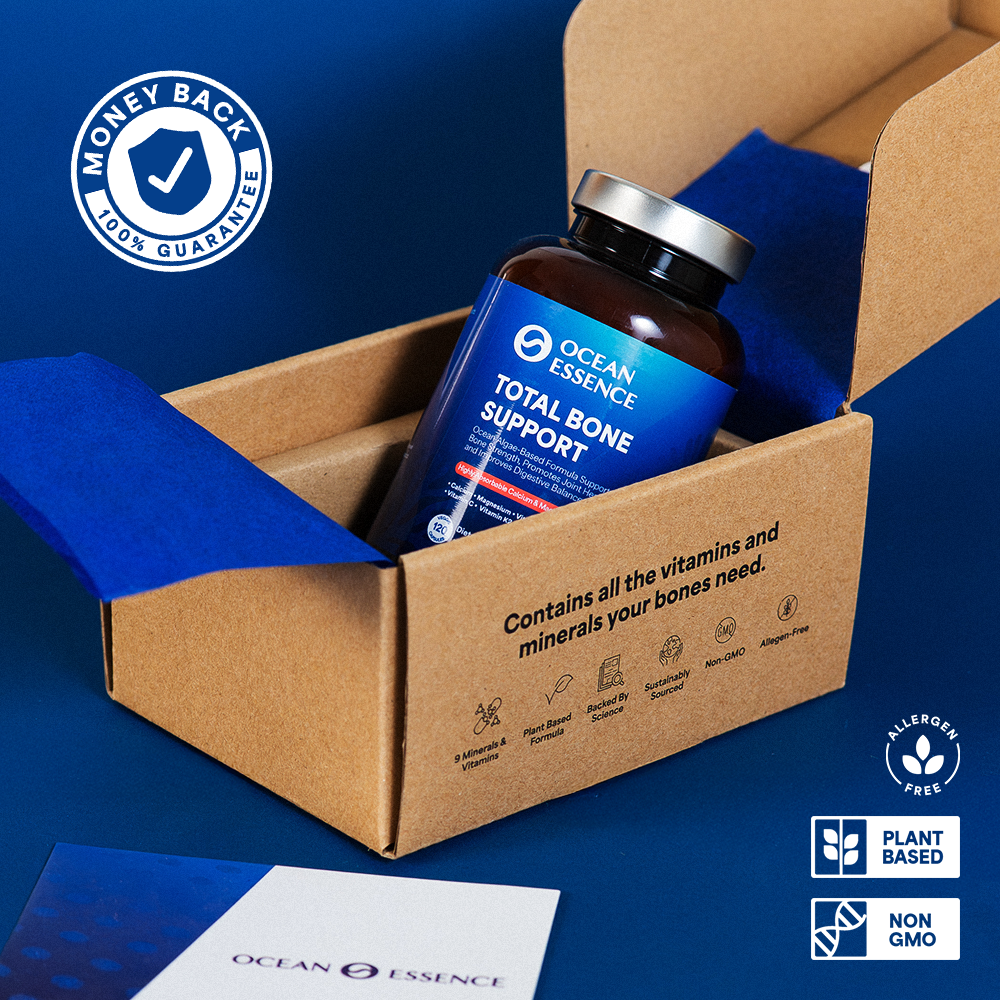

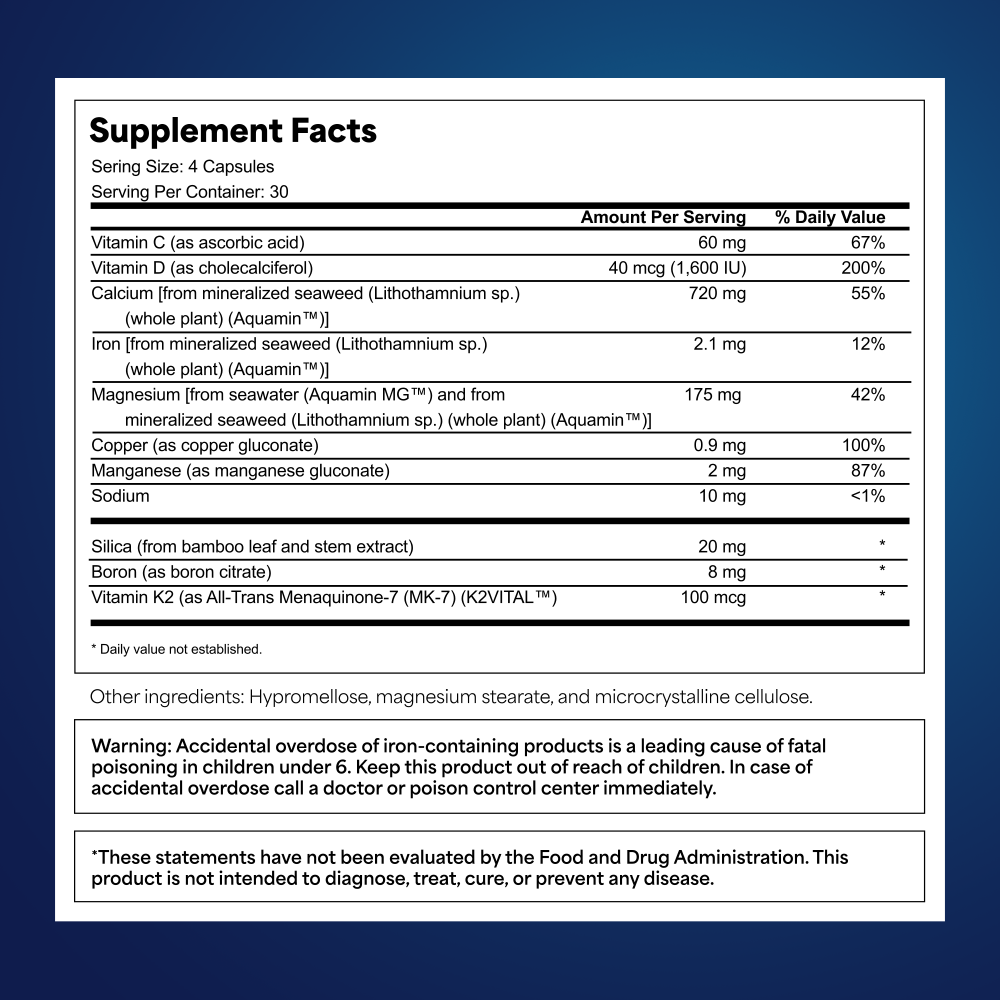
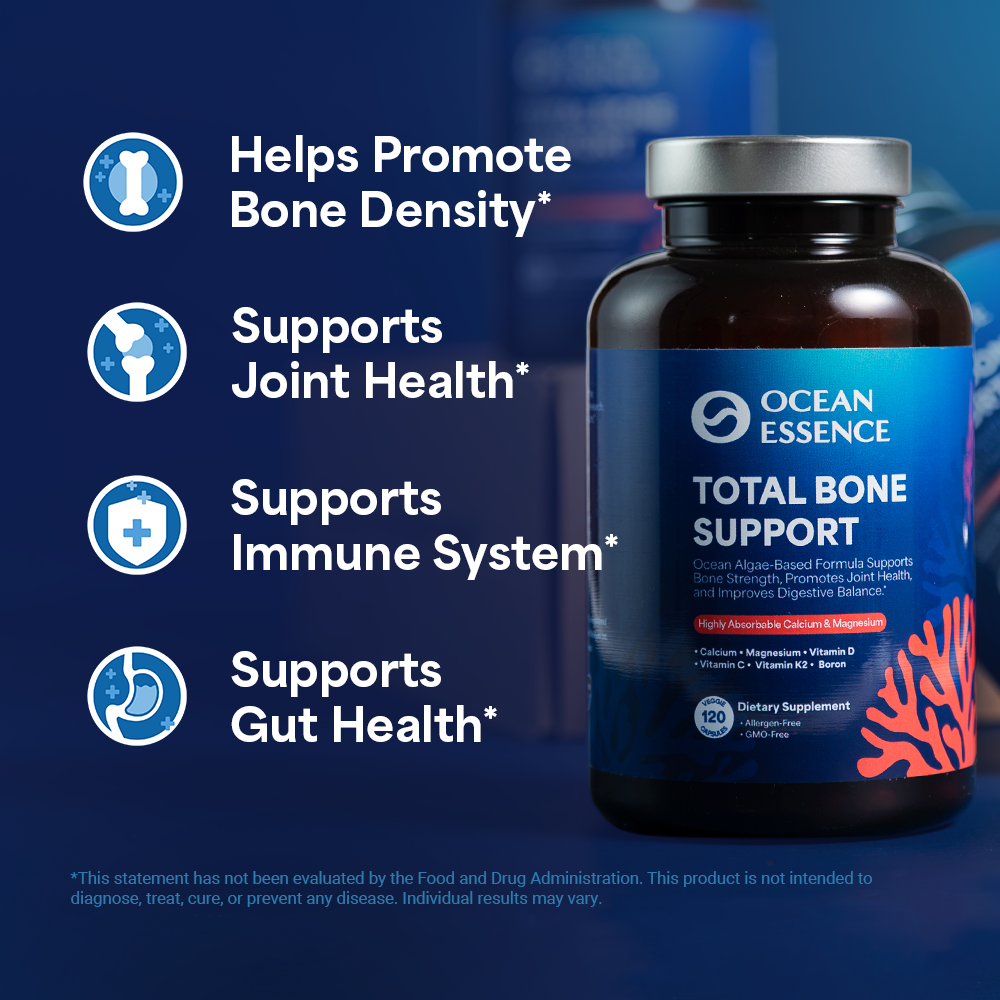
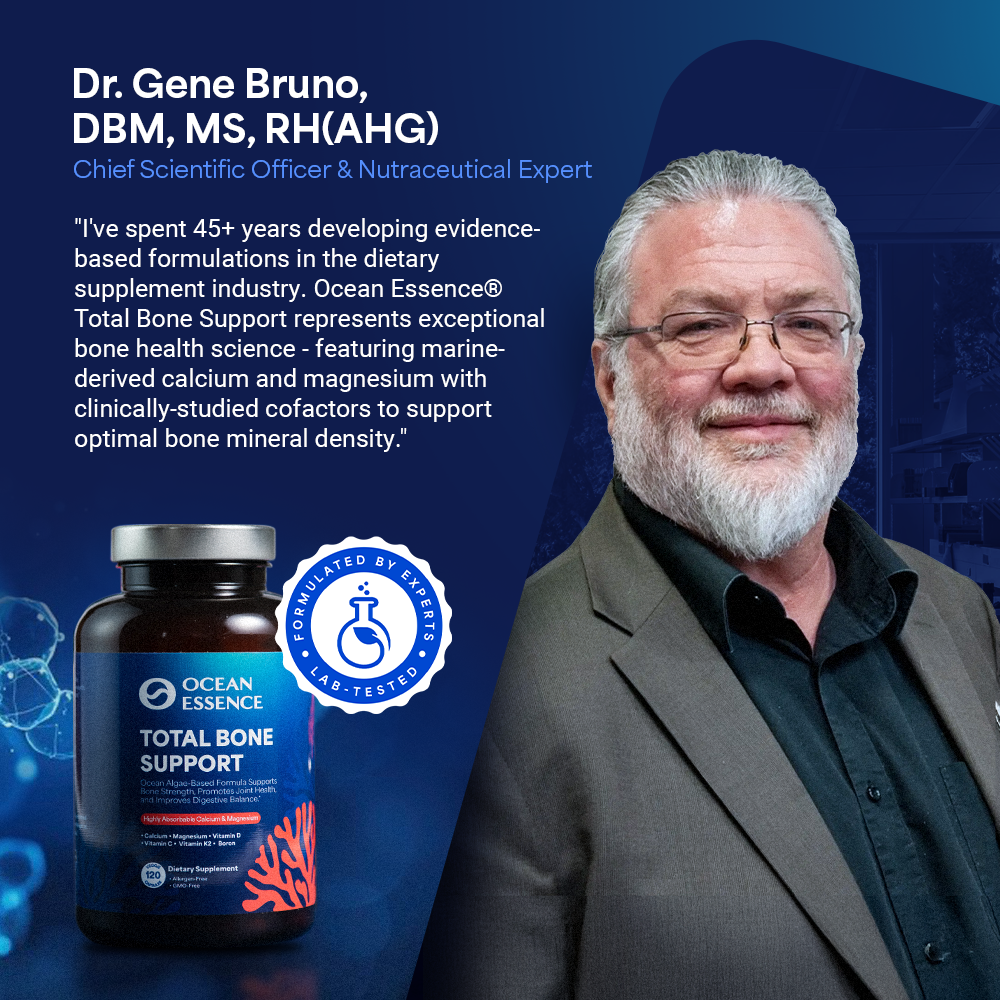
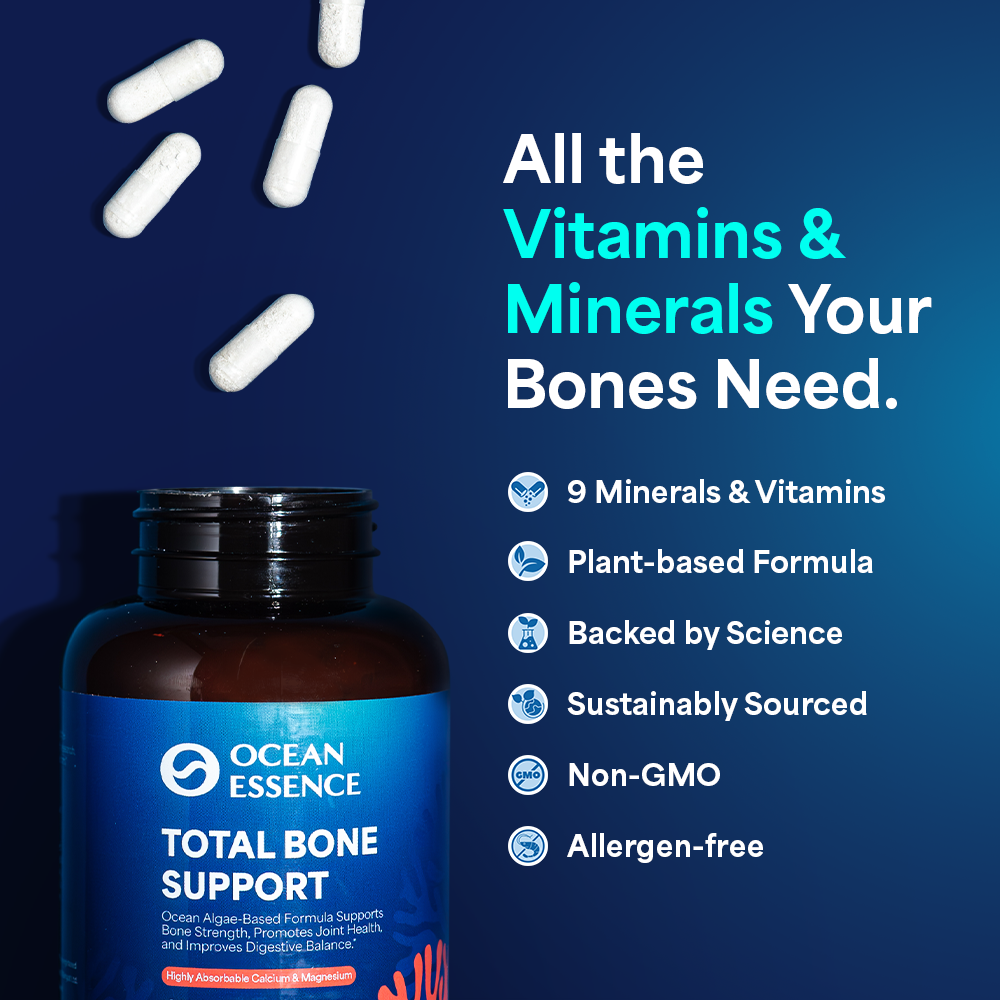
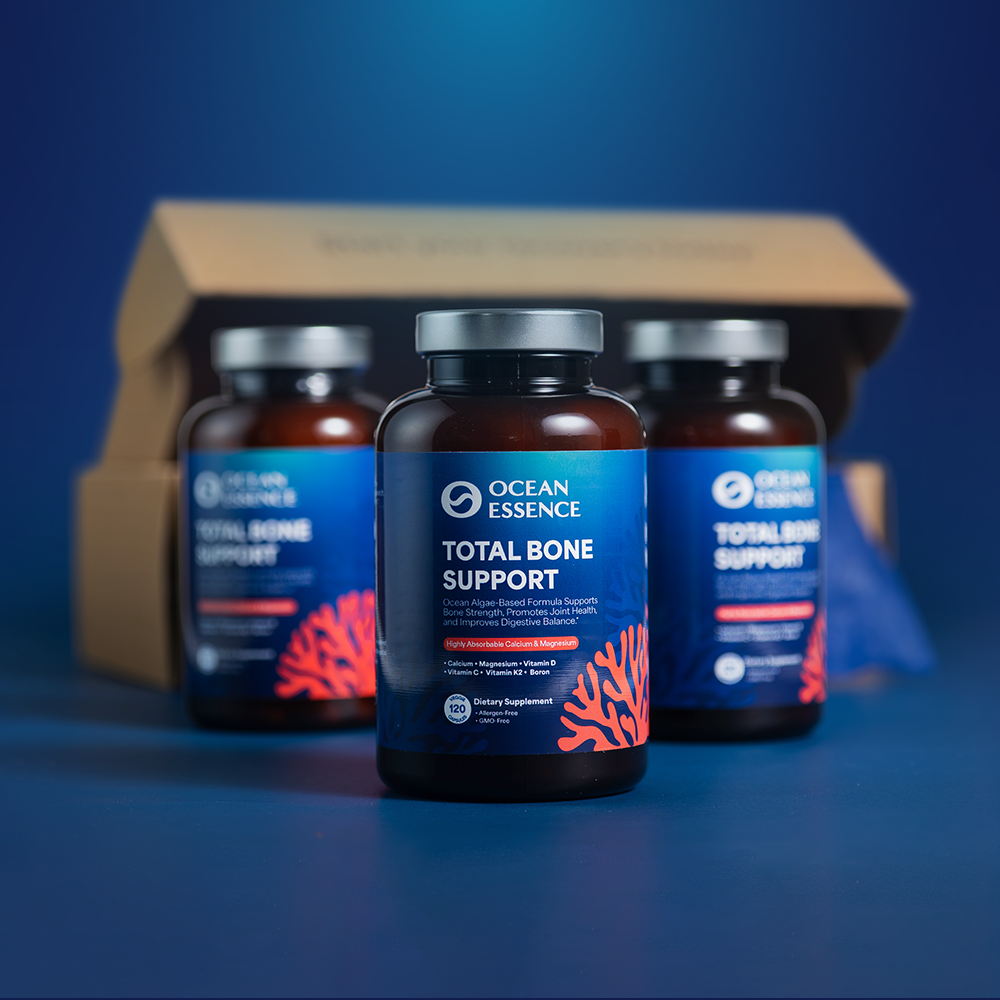
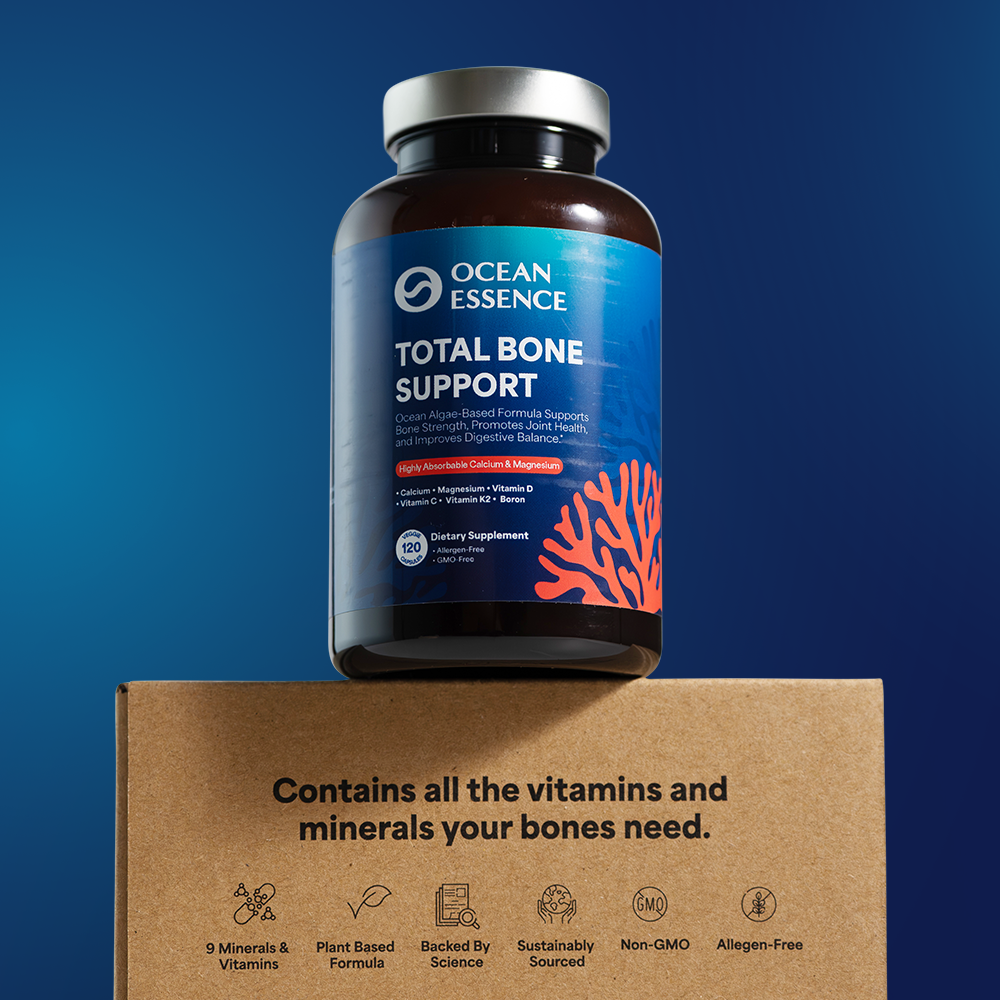
Ocean Essence - Total Bone Support
Support Bone Density*
Product Description:
Ocean Essence - Total Bone Support is an algae-based calcium supplement rich in key vitamins and minerals your bones need. Helps promote bone density.*
Supplement Facts:

Select Frequency:
Subscribe & Save 15%
Amount:
-
-
-
-
Subscription:
365 Day Money-Back Guarantee
Not satisfied? Get a full refund.*

Manufactured In The USA
Crafted in the USA for superior quality and reliability.

2-5 Day Shipping & Delivery With USPS ground
Experience Fast and Reliable Shipping Nationwide
REVIEWS
References:
(1) Theobald, H. E. (2005). Dietary calcium and health. Nutrition Bulletin, 30(3), 237–277. https://doi.org/10.1111/j.1467-3010.2005.00514.x
(2) Fujita, T. (2000). Calcium paradox: consequences of calcium deficiency manifested by a wide variety of diseases. Journal of Bone and Mineral Metabolism, 18(4), 234–236. https://doi.org/10.1007/PL00010637
(3) Lal, R. (2009). Soil degradation as a reason for inadequate human nutrition. Food Security, 1(1), 45–57. https://doi.org/10.1007/s12571-009-0009-z

